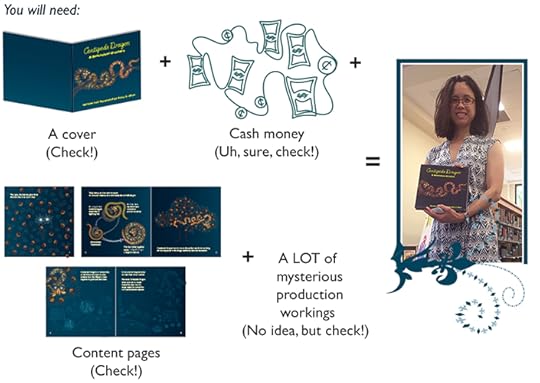How to make a book
After my editor-feedback encounter, I decided to assess my situation. I had been submitting Centipede Dragon to publishing companies for two years without feedback for its rejection. I had tested the book out on my actual target audience with rave reviews in return. I had incorporated numerous suggested changes to both text and imagery from anyone willing to give me honest opinions. I had constantly striven to make the book the best it could be, to the best of MY capability. But the bottom line is, I’m not in publishing, and I don’t KNOW what it takes to make a successful book. What I had was a story and the desire to tell it. And no matter how much I read or how many conferences I attend, nothing substitutes for real experience.
I admit it, I don’t know what sells. I frankly thought a half-this, half-that creature would be a great hook, not to mention the magical thing. If I figured the insect-dragon thing could catch the boys while the strong, girl character Ariel character and sensitive nature of the story could hook the girls. But no one in the industry was seemingly agreeing. So, if no publishing expert will provide any specific direction, what do I do?
At this point, I was tired and frustrated. I almost wished for blunt feedback:
“Look, your story is boring and predictable,”
“Your illustrations reveal your deficits in artistic training.”
I wanted a clue, a sign that would signal me to just let it go.
In the course of my many searches for traditional publishers to submit to, a whole host of self-publishers kept cropping up along with them. E-publishers like Smashwords were being profiled on NPR’s “All Things Considered” as the leader in the next generation of publishing, and so this tiny seed of an idea sprouted to mind. I had not considered self-publishing to this point, but was the time to look into it now?

I admit it, I don’t know what sells. I frankly thought a half-this, half-that creature would be a great hook, not to mention the magical thing. If I figured the insect-dragon thing could catch the boys while the strong, girl character Ariel character and sensitive nature of the story could hook the girls. But no one in the industry was seemingly agreeing. So, if no publishing expert will provide any specific direction, what do I do?
At this point, I was tired and frustrated. I almost wished for blunt feedback:
“Look, your story is boring and predictable,”
“Your illustrations reveal your deficits in artistic training.”
I wanted a clue, a sign that would signal me to just let it go.
In the course of my many searches for traditional publishers to submit to, a whole host of self-publishers kept cropping up along with them. E-publishers like Smashwords were being profiled on NPR’s “All Things Considered” as the leader in the next generation of publishing, and so this tiny seed of an idea sprouted to mind. I had not considered self-publishing to this point, but was the time to look into it now?

Published on August 18, 2015 05:35
No comments have been added yet.



